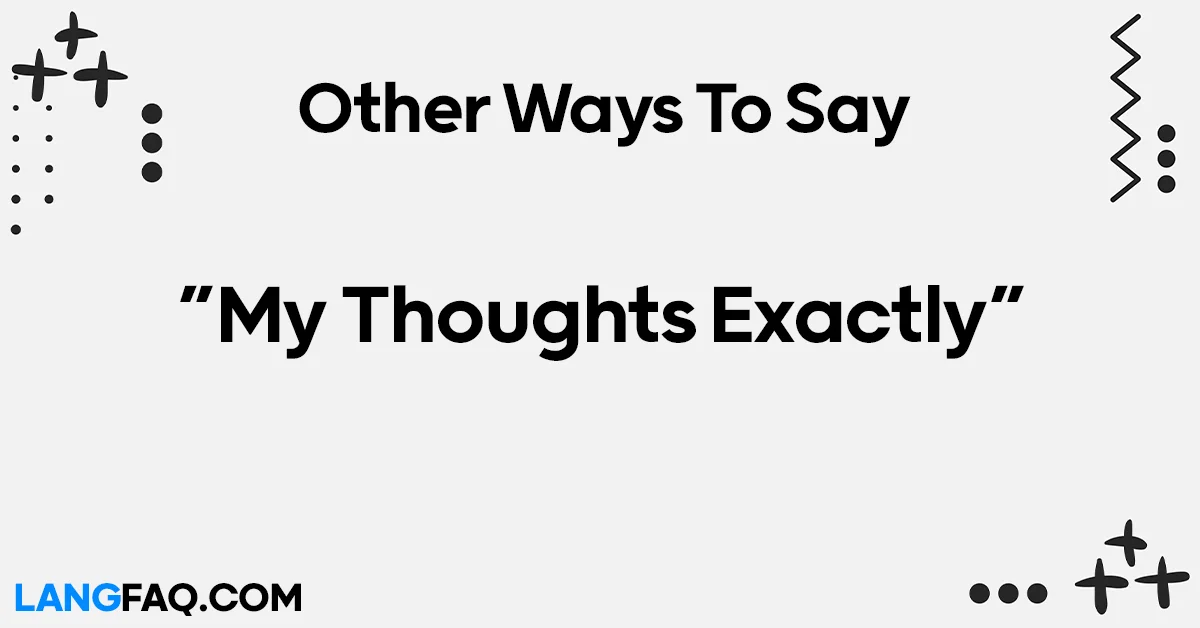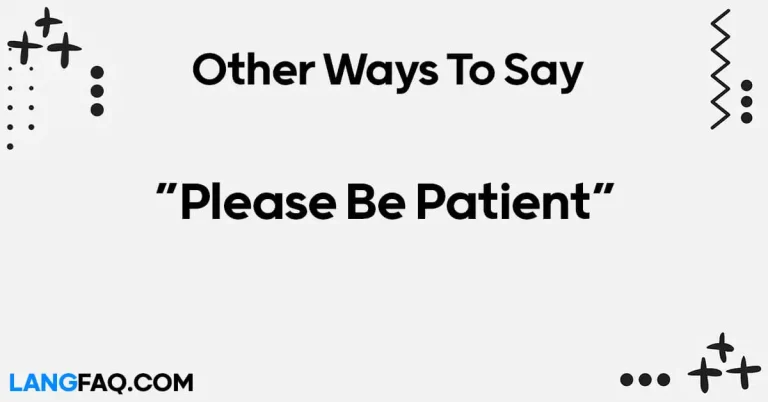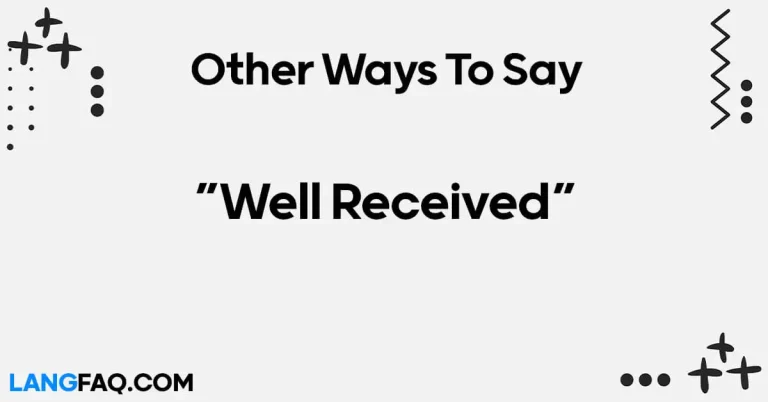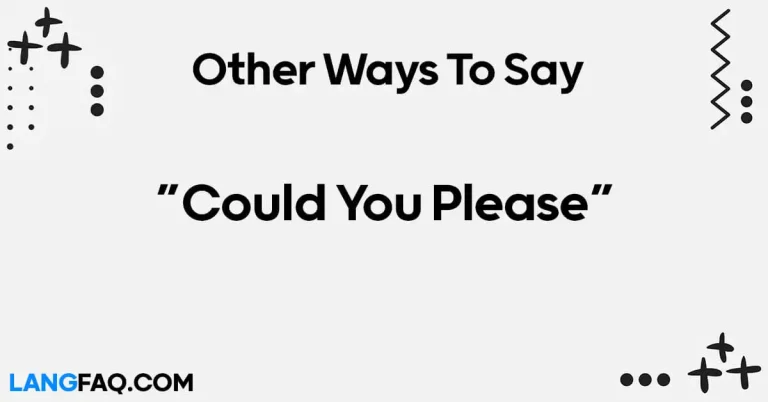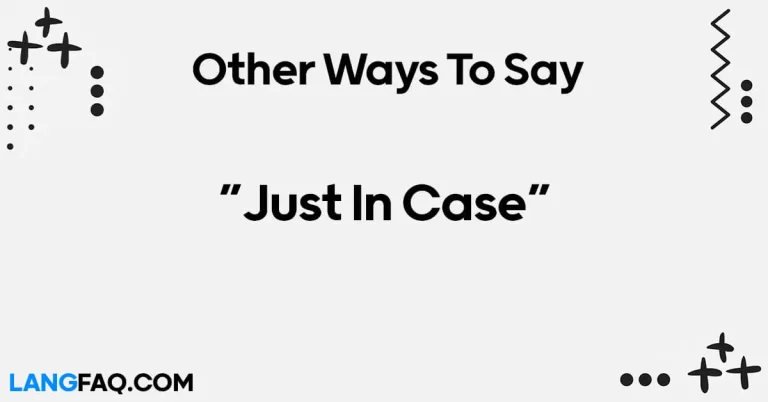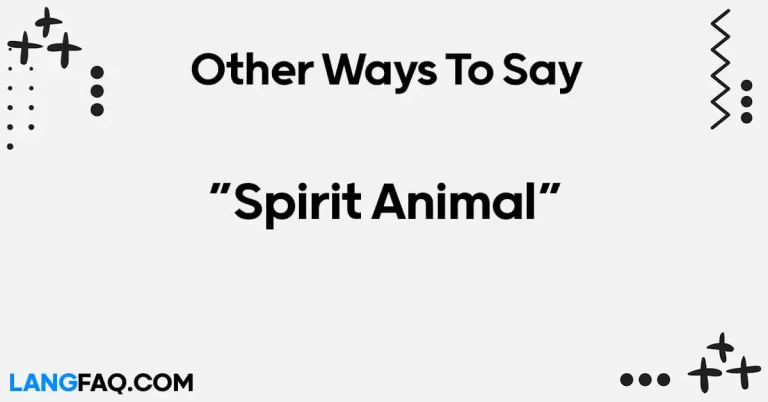Welcome to a linguistic adventure where we delve into the rich tapestry of expression! In this article, we unlock 12 other ways to convey the sentiment of “My Thoughts Exactly.” Communication is an art, and finding diverse ways to articulate agreement enhances our ability to connect. Let’s explore alternatives that not only convey agreement but also add a touch of individuality to your expressions.
12 Other Ways to Say “My Thoughts Exactly”
Here are 12 other ways to say “My Thoughts Exactly”:
- I couldn’t agree more.
- That’s exactly what I was thinking.
- You’ve captured my sentiments precisely.
- I’m in complete accord with you.
- My feelings exactly.
- You’ve hit the nail on the head.
- Absolutely right.
- I concur wholeheartedly.
- You’ve expressed my thoughts perfectly.
- Spot on!
- I’m with you 100%.
- You’ve read my mind.
Here’s a table with meanings and examples for the 12 other ways to say “My Thoughts Exactly”:
| Expression | Meaning | Example |
|---|---|---|
| I couldn’t agree more. | Strongly agreeing with the presented idea. | “Your analysis of the situation is spot-on, and I couldn’t agree more.” |
| That’s exactly what I was thinking. | Confirming alignment with someone’s thoughts. | “Your suggestion to improve efficiency is exactly what I was thinking.” |
| You’ve captured my sentiments precisely. | Acknowledging that someone has expressed one’s feelings accurately. | “In your speech, you’ve captured my sentiments precisely about the importance of teamwork.” |
| I’m in complete accord with you. | Expressing complete agreement. | “I’m in complete accord with your proposal for the new project strategy.” |
| My feelings exactly. | Confirming that one’s emotions match the expressed sentiments. | “When you described the beauty of the sunset, my feelings exactly echoed yours.” |
| You’ve hit the nail on the head. | Acknowledging someone for being accurate and perceptive. | “Your analysis of the market trends has hit the nail on the head; it’s exactly what we needed.” |
| Absolutely right. | Strongly affirming the correctness of the presented thoughts. | “Your decision to prioritize customer satisfaction is absolutely right.” |
| I concur wholeheartedly. | Expressing heartfelt and complete agreement. | “I concur wholeheartedly with the values you outlined for our team.” |
| You’ve expressed my thoughts perfectly. | Recognizing that someone has articulated one’s thoughts precisely. | “In your article, you’ve expressed my thoughts perfectly regarding environmental conservation.” |
| Spot on! | Confirming that something is exactly correct. | “Your explanation of the complex concept was spot on; I understood it perfectly.” |
| I’m with you 100%. | Emphasizing full support and agreement. | “In the pursuit of innovation, I’m with you 100%; let’s explore new possibilities together.” |
| You’ve read my mind. | Playfully suggesting that someone has understood one’s thoughts without them being spoken. | “When you suggested a beach vacation, you’ve read my mind; that’s exactly what I needed.” |
This diverse array of expressions provides a vibrant palette for articulating agreement. From formal to casual settings, these alternatives to “My Thoughts Exactly” allow for nuanced and varied communication. Whether acknowledging precision, affirming heartfelt accord, or playfully noting a mind-reading moment, these phrases add depth and individuality to your expressions of agreement. Embrace this linguistic diversity to enhance your communication skills and connect with others on a more profound level.
Is It Correct to Say “My Thoughts Exactly”?
Yes, “My Thoughts Exactly” is a correct and commonly used phrase in English. It is employed to convey complete agreement with what has just been said or expressed. This expression indicates that the speaker shares the same opinion, sentiment, or perspective as the person they are responding to.
Example: Person A: “This new policy will streamline our workflow and enhance efficiency.” Person B: “My thoughts exactly. It’s a positive step forward for our team.”
In this example, Person B is affirming that their own thoughts align precisely with what Person A has just stated. The phrase is straightforward, widely understood, and appropriate in both formal and informal contexts.
Professional Mail Example With “My Thoughts Exactly”
Subject: Agreement on Proposed Project Amendments
Dear [Recipient’s Name],
I trust this message finds you well. After a thorough review of the proposed amendments to the project timeline and deliverables, I felt compelled to reach out and express my thoughts.
Your strategic adjustments not only align seamlessly with our overarching goals but also address the challenges we’ve encountered effectively. The emphasis on increased collaboration and resource optimization is a commendable approach, and I believe it will significantly contribute to our project’s success.
In particular, the decision to prioritize client feedback in the upcoming phase resonates strongly with me. It’s a step in the right direction towards ensuring client satisfaction and project excellence. My thoughts exactly align with the proposed changes.
I appreciate the meticulous thought and effort you’ve put into refining our project strategy. It’s evident that these adjustments are not only well-considered but also essential for our continued progress.
If there are any additional details or insights you’d like to discuss further, I am more than open to scheduling a meeting at your earliest convenience.
Thank you for your leadership and commitment to project excellence.
Best regards,
[Your Full Name] [Your Position] [Your Contact Information]
1. I Couldn’t Agree More
Expressing strong agreement is a fundamental aspect of effective communication. When you find yourself resonating completely with someone’s idea or proposal, the phrase “I Couldn’t Agree More” comes to your linguistic rescue. This expression conveys not just agreement but a heightened level of endorsement. It’s versatile, suitable for both formal and informal contexts.
Example: Formal Context: In a business meeting, when discussing a new marketing strategy, you might say, “Your insights into targeting a younger demographic are exceptional. I couldn’t agree more with the need to adapt our approach.”
Informal Context: Among friends planning a weekend getaway, “Choosing the beach as our destination? I couldn’t agree more! It’s the perfect place to unwind.”
Email Sample:
Subject: Agreement on the Proposed Changes
Dear [Recipient’s Name],
I’ve carefully reviewed the proposed changes, and I must say, I couldn’t agree more with the direction you’ve outlined. The adjustments align perfectly with our goals and objectives.
Best regards, [Your Name]
Variations:
- Colleague Context: “I fully support your proposal.”
- Mentor-Mentee Context: “Your guidance is invaluable; I couldn’t agree more.”
- Casual Setting: “Pizza for dinner? I couldn’t agree more!”
Pros:
- Conveys strong agreement.
- Suitable for various contexts.
Cons:
- May sound overly formal in very casual situations.
Cambridge Dictionary Insight: “The phrase ‘I Couldn’t Agree More’ is a polite and emphatic way of expressing complete agreement or alignment with someone else’s statement, opinion, or proposal.”
Grammar/Usage Tip: Avoid using this phrase when expressing disagreement or in situations where a more neutral stance is required.
2. That’s Exactly What I Was Thinking
When you want to affirm that someone has perfectly articulated your thoughts, “That’s Exactly What I Was Thinking” becomes your linguistic ally. It’s a versatile expression suitable for both professional and personal conversations.
Example: Formal Context: During a project discussion at work, “Your suggestion to streamline the workflow is spot-on. That’s exactly what I was thinking.”
Informal Context: Discussing weekend plans with a friend, “A picnic in the park? That’s exactly what I was thinking! Great minds think alike.”
Email Sample:
Subject: Alignment on Project Approaches
Dear [Recipient’s Name],
I wanted to express my alignment with your proposed approaches for the upcoming project. That’s exactly what I was thinking in terms of efficiency and effectiveness.
Best regards, [Your Name]
Variations:
- Colleague Context: “Your idea resonates perfectly with my thoughts.”
- Mentor-Mentee Context: “Your insights mirror my own considerations.”
- Casual Setting: “Ice cream for dessert? That’s exactly what I was thinking!”
Pros:
- Acknowledges alignment of thoughts.
- Adds a personal touch to agreement.
Cons:
- May be perceived as informal in highly formal settings.
Cambridge Dictionary Insight: “The phrase ‘That’s Exactly What I Was Thinking’ expresses strong agreement, affirming that the speaker’s thoughts align precisely with the expressed ideas of another person.”
Grammar/Usage Tip: Use this expression when you want to emphasize the precise match between your thoughts and someone else’s.
3. You’ve Captured My Sentiments Precisely
Adding a touch of sophistication to your agreement, “You’ve Captured My Sentiments Precisely” conveys not just agreement but appreciation for the precise expression of your feelings. It’s ideal for formal contexts where a more refined tone is preferred.
Example: Formal Context: During a conference call discussing market trends, “Your analysis of consumer behavior is impeccable. You’ve captured my sentiments precisely.”
Informal Context: Sharing personal experiences with a friend, “Your description of that moment in the movie? You’ve captured my sentiments precisely. It was truly moving.”
Email Sample:
Subject: Appreciation for Your Insights
Dear [Recipient’s Name],
I wanted to express my appreciation for your recent insights. Your articulation of the challenges we face has been remarkable, and you’ve captured my sentiments precisely.
Best regards, [Your Name]
Variations:
- Colleague Context: “Your presentation captured the team’s sentiments precisely.”
- Mentor-Mentee Context: “Your guidance on this matter has captured my sentiments perfectly.”
- Casual Setting: “Your choice of music? You’ve captured my sentiments precisely!”
Pros:
- Adds a touch of elegance to agreement.
- Demonstrates appreciation for precise expression.
Cons:
- May sound too formal in very casual settings.
Cambridge Dictionary Insight: “This phrase is a refined way of expressing agreement, indicating that the speaker’s sentiments have been accurately and precisely captured by the person being addressed.”
Grammar/Usage Tip: Use this phrase when you want to convey not just agreement but admiration for the precision in expressing your feelings.
4. I’m in Complete Accord with You
When you’re aiming for a more formal tone to express complete agreement, “I’m in Complete Accord with You” is a stellar choice. This phrase emphasizes a high level of alignment in a professional or serious context.
Example: Formal Context: In a boardroom discussion, “The proposed budgetary adjustments are essential, and I’m in complete accord with you on this matter.”
Informal Context: Discussing family plans, “The decision to celebrate at home? I’m in complete accord with you. It sounds like the perfect way to spend the holidays.”
Email Sample:
Subject: Full Agreement on Project Milestones
Dear [Recipient’s Name],
After reviewing the proposed project milestones, I must express that I’m in complete accord with you. The strategic direction aligns seamlessly with our objectives.
Best regards, [Your Name]
Variations:
- Colleague Context: “In complete accord with your proposed timeline.”
- Mentor-Mentee Context: “I’m in complete accord with your professional guidance.”
- Casual Setting: “Movie night? I’m in complete accord with that idea!”
Pros:
- Emphasizes a high level of agreement.
- Conveys formality and seriousness.
Cons:
- May sound too formal in casual conversations.
Cambridge Dictionary Insight: “The phrase ‘I’m in Complete Accord with You’ signifies complete agreement, often used in formal or professional contexts to convey a serious and aligned stance.”
Grammar/Usage Tip: Ideal for situations where a formal and serious tone is required, such as in business discussions or professional correspondence.
5. My Feelings Exactly
Adding a personal touch to your agreement, “My Feelings Exactly” is a versatile phrase suitable for various contexts. It communicates not only alignment of thoughts but also an emotional resonance with the expressed sentiments.
Example: Formal Context: During a team meeting, “Your proposal for employee well-being programs is not just strategic; it aligns with our values. My feelings exactly.”
Informal Context: Discussing a favorite book with a friend, “When you said the ending was bittersweet? My feelings exactly. It left a lasting impact.”
Email Sample:
Subject: Alignment with Project Vision
Dear [Recipient’s Name],
I wanted to express my alignment with the vision you’ve outlined for the upcoming project. It’s not just professional; it resonates personally—my feelings exactly.
Best regards, [Your Name]
Variations:
- Colleague Context: “The new office layout? My feelings exactly; it promotes collaboration.”
- Mentor-Mentee Context: “Your advice on work-life balance? My feelings exactly.”
- Casual Setting: “Choosing a beach holiday? My feelings exactly!”
Pros:
- Infuses a personal connection into the agreement.
- Suitable for both formal and informal settings.
Cons:
- May be perceived as informal in highly formal contexts.
Cambridge Dictionary Insight: “The expression ‘My Feelings Exactly’ conveys not just agreement but a personal resonance with the sentiments expressed by someone else.”
Grammar/Usage Tip: Use this phrase when you want to emphasize a personal connection to the expressed thoughts or ideas.
6. You’ve Hit the Nail on the Head
Bringing a metaphorical flair to agreement, “You’ve Hit the Nail on the Head” suggests accuracy and precision. It’s a dynamic phrase suitable for various contexts, adding a touch of vividness to your expressions of concurrence.
Example: Formal Context: In a marketing strategy discussion, “Your analysis of consumer trends? You’ve hit the nail on the head. It’s precisely what our campaigns need.”
Informal Context: Discussing weekend plans, “A hike in the mountains? You’ve hit the nail on the head! That’s exactly the adventure I was craving.”
Email Sample:
Subject: Acknowledgment of Your Insights
Dear [Recipient’s Name],
I wanted to express my acknowledgment of your recent insights. Your understanding of market dynamics is impressive, and you’ve hit the nail on the head.
Best regards, [Your Name]
Variations:
- Colleague Context: “Your proposal for cost-saving measures? You’ve hit the nail on the head.”
- Mentor-Mentee Context: “Your guidance on career development? You’ve hit the nail on the head.”
- Casual Setting: “Sushi for dinner? You’ve hit the nail on the head!”
Pros:
- Infuses metaphorical vividness into agreement.
- Conveys a strong sense of accuracy.
Cons:
- May sound overly metaphorical in some professional contexts.
Cambridge Dictionary Insight: “The idiom ‘Hit the Nail on the Head’ signifies precise understanding or accuracy in a statement or action, often used to express strong agreement.”
7. Absolutely Right
In situations demanding unequivocal agreement, “Absolutely Right” is a phrase that leaves no room for doubt. It’s straightforward and emphatic, making it suitable for both formal and casual settings when a strong affirmation is needed.
Example: Formal Context: In a project review meeting, “Your decision to prioritize customer satisfaction? Absolutely right. It aligns perfectly with our company values.”
Informal Context: Discussing weekend plans, “Opting for a movie night? Absolutely right! It’s the perfect way to unwind.”
Email Sample:
Subject: Full Support for Proposed Changes
Dear [Recipient’s Name],
I’ve reviewed the proposed changes, and I must say, your insights are absolutely right. They address our current challenges effectively.
Best regards, [Your Name]
Variations:
- Colleague Context: “Your approach to problem-solving is absolutely right.”
- Mentor-Mentee Context: “Your decision to pursue further education is absolutely right.”
- Casual Setting: “Choosing pizza for lunch? Absolutely right!”
Pros:
- Conveys unequivocal agreement.
- Suitable for various contexts.
Cons:
- May sound overly assertive in certain situations.
Cambridge Dictionary Insight: “The phrase ‘Absolutely Right’ is a straightforward and emphatic way of expressing complete and unwavering agreement with someone else’s statement or decision.”
Grammar/Usage Tip: Use this phrase when you want to express strong agreement without any reservation or ambiguity.
8. I Concur Wholeheartedly
For a more formal and sophisticated expression of agreement, “I Concur Wholeheartedly” is an excellent choice. It communicates not just agreement but a deep and sincere alignment with the presented thoughts.
Example: Formal Context: During a board meeting, “Your proposal for sustainable practices? I concur wholeheartedly. It reflects our commitment to environmental responsibility.”
Informal Context: Discussing family decisions, “The decision to support a local charity? I concur wholeheartedly. It’s a meaningful contribution.”
Email Sample:
Subject: Alignment with Proposed Initiatives
Dear [Recipient’s Name],
Having considered your proposed initiatives, I must express that I concur wholeheartedly. Your vision aligns seamlessly with our organizational values.
Best regards, [Your Name]
Variations:
- Colleague Context: “I concur wholeheartedly with the proposed budget allocations.”
- Mentor-Mentee Context: “Your career advice resonates deeply, and I concur wholeheartedly.”
- Casual Setting: “Choosing a road trip? I concur wholeheartedly!”
Pros:
- Adds a touch of sincerity and depth to agreement.
- Ideal for formal and serious contexts.
Cons:
- May sound too formal in casual conversations.
Cambridge Dictionary Insight: “The phrase ‘I Concur Wholeheartedly’ is a formal and sincere way of expressing complete agreement, emphasizing a deep alignment with the sentiments expressed by someone else.”
Grammar/Usage Tip: Use this phrase in professional settings where a more formal and sincere tone is appropriate.
9. You’ve Expressed My Thoughts Perfectly
When someone articulates your thoughts with precision, acknowledging this with “You’ve Expressed My Thoughts Perfectly” adds a layer of appreciation to your agreement. This phrase is versatile and suitable for a range of contexts, from formal to informal.
Example: Formal Context: In a brainstorming session, “Your proposal for innovation aligns seamlessly with our goals. You’ve expressed my thoughts perfectly.”
Informal Context: Discussing a favorite hobby with a friend, “When you said how therapeutic gardening is? You’ve expressed my thoughts perfectly. It’s my sanctuary too.”
Email Sample:
Subject: Appreciation for Your Proposal
Dear [Recipient’s Name],
I wanted to extend my appreciation for your recent proposal. You’ve expressed my thoughts perfectly, and your ideas are integral to our project’s success.
Best regards, [Your Name]
Variations:
- Colleague Context: “In your email, you’ve expressed the team’s thoughts perfectly.”
- Mentor-Mentee Context: “Your insights into professional development? You’ve expressed my thoughts perfectly.”
- Casual Setting: “Choosing a game night? You’ve expressed my thoughts perfectly!”
Pros:
- Adds a layer of appreciation to agreement.
- Suitable for various contexts.
Cons:
- May sound overly formal in very casual settings.
Cambridge Dictionary Insight: “The expression ‘You’ve Expressed My Thoughts Perfectly’ conveys not just agreement but an appreciation for the precise articulation of the speaker’s thoughts by another person.”
Grammar/Usage Tip: Use this phrase when you want to emphasize the precision with which someone has captured your thoughts or ideas.
10. Spot On!
When you want to express that something is precisely correct or perfectly aligned, “Spot On!” is a concise and dynamic choice. It adds energy to your agreement and is suitable for both formal and informal situations.
Example: Formal Context: In a strategic planning session, “Your assessment of market opportunities? Spot on! It lays the foundation for our growth strategy.”
Informal Context: Discussing a friend’s characterization of an event, “Your description of the concert? Spot on! It captured the atmosphere perfectly.”
Email Sample:
Subject: Agreement on Project Milestones
Dear [Recipient’s Name],
Having reviewed the proposed project milestones, I must express that your plan is spot on. It aligns precisely with our objectives.
Best regards, [Your Name]
Variations:
- Colleague Context: “Your timeline proposal is spot on for the project.”
- Mentor-Mentee Context: “Your advice on networking is spot on for career growth.”
- Casual Setting: “Choosing a picnic? Spot on!”
Pros:
- Adds energy and enthusiasm to agreement.
- Concise and impactful.
Cons:
- May sound informal in very formal contexts.
Cambridge Dictionary Insight: “The term ‘Spot On’ is an informal and concise way of expressing that something is precisely correct or accurate, often used to convey strong agreement.”
Grammar/Usage Tip: Ideal for situations where you want to emphasize the precision or correctness of someone’s thoughts or ideas in a dynamic manner.
11. I’m with You 100%
For a colloquial and emphatic expression of complete agreement, “I’m with You 100%” is a powerful choice. It conveys not just alignment but unwavering support, making it suitable for both professional and personal contexts.
Example: Formal Context: In a team meeting discussing a change in strategy, “Your decision to embrace innovation? I’m with you 100%. It’s the way forward for our company.”
Informal Context: Discussing vacation plans with friends, “Opting for a road trip? I’m with you 100%! It promises adventure and bonding.”
Email Sample:
Subject: Full Support for New Initiatives
Dear [Recipient’s Name],
Having considered the proposed initiatives, I must express that I’m with you 100%. Your vision aligns seamlessly with our goals.
Best regards, [Your Name]
Variations:
- Colleague Context: “In the team’s decision-making, I’m with you 100%.”
- Mentor-Mentee Context: “Your career aspirations? I’m with you 100%.”
- Casual Setting: “Trying a new restaurant? I’m with you 100%!”
Pros:
- Conveys unwavering support and agreement.
- Suitable for various contexts.
Cons:
- May sound overly casual in very formal settings.
Cambridge Dictionary Insight: “The phrase ‘I’m with You 100%’ is a colloquial and emphatic way of expressing complete and unwavering agreement, often used to convey strong support for someone else’s decisions or ideas.”
Grammar/Usage Tip: Use this phrase when you want to express not just agreement but full support and alignment with someone’s decisions or ideas.
12. You’ve Read My Mind
Adding a touch of playfulness to agreement, “You’ve Read My Mind” suggests an intuitive understanding of your thoughts. It’s a dynamic phrase suitable for informal contexts where a more casual tone is appropriate.
Example: Informal Context: Planning a surprise party with a friend, “Suggesting a beach day? You’ve read my mind! It’s exactly what I was hoping for.”
Casual Setting: Discussing weekend plans, “Choosing a movie night? You’ve read my mind! I was in the mood for some relaxation.”
Email Sample:
Subject: Excitement for Upcoming Plans
Dear [Recipient’s Name],
Your suggestion for a team-building activity is fantastic! You’ve read my mind, and it aligns perfectly with fostering camaraderie.
Best regards, [Your Name]
Variations:
- Colleague Context: “Suggesting a brainstorming session? You’ve read my mind for enhancing creativity.”
- Mentor-Mentee Context: “Your advice on skill development? You’ve read my mind for career growth.”
- Casual Setting: “Opting for a game night? You’ve read my mind!”
Pros:
- Adds a playful and intuitive dimension to agreement.
- Suitable for informal and friendly contexts.
Cons:
- May sound too casual in very formal situations.
Cambridge Dictionary Insight: “The expression ‘You’ve Read My Mind’ conveys a playful acknowledgment of someone accurately understanding or anticipating the speaker’s thoughts or preferences.”
Grammar/Usage Tip: Use this phrase when you want to add a playful or intuitive tone to your agreement, emphasizing a shared understanding.
Frequently Asked Questions (FAQs)
Q: Can I use these expressions in formal settings? Absolutely! While some are casual, many alternatives are versatile and suitable for formal communication.
Q: Are these alternatives region-specific? Not at all. These expressions have universal applicability and can be used across different English-speaking regions.
Q: How do I choose the right alternative for a given context? Consider the tone and formality of the conversation. Opt for expressions that align with the overall communication style.
Q: Are these alternatives suitable for written communication? Certainly. These expressions can enhance written communication, adding variety and depth to your agreements.
Q: Can I use these alternatives in professional emails? Yes, many alternatives are suitable for professional communication, offering a refined way to express agreement.
Q: Do these alternatives work in casual conversations? Absolutely! From formal to casual settings, these alternatives cater to a broad range of conversational contexts.
Conclusion
In the realm of expression, variety is key. Elevate your agreement game by incorporating these 12 alternatives to “My Thoughts Exactly” into your vocabulary. Language is a dynamic tool, and embracing diverse ways to convey agreement enhances our communicative prowess. So go ahead, express yourself with flair and precision!

